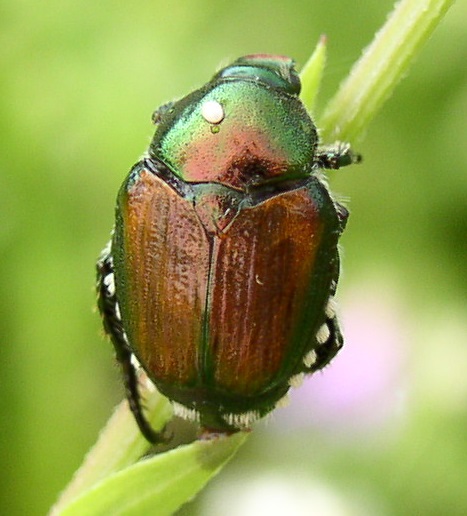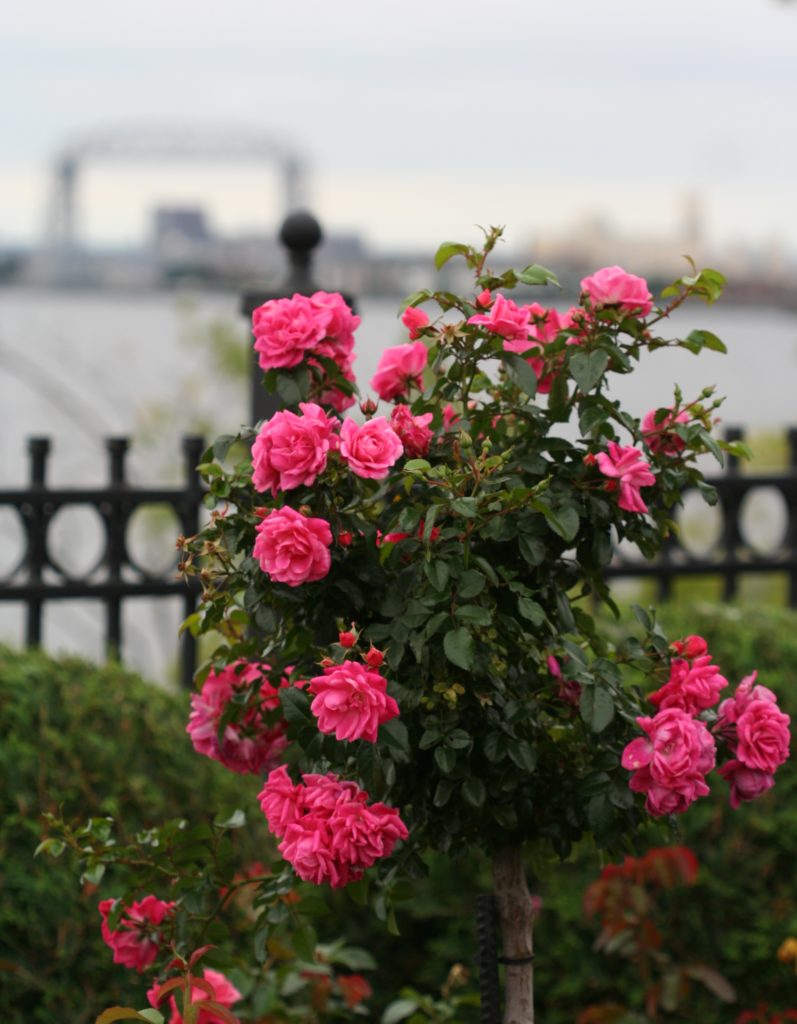Japanese beetles may be the pest Minnesota gardeners love to hate the most. During my recent conversation with David Zlesak, professor and rose breeder, on the Grow it, Minnesota podcast, we talked about strategies for out-smarting Japanese beetles and he gave me some good news about the beetles in Minnesota.
A New Parasite is Here

That’s the good news. Apparently Japanese beetles (Popillia japonica) have a parasite—it’s called the winsome fly and they have been spotted in the Lyndale Park Rose Gardens. (I spotted some recently, too.)
If you are not familiar with them, Japanese beetles have been in the United States for more than 100 years and in Minnesota for about 50. They were accidentally introduced in New Jersey and have been steadily moving west since then. These iridescent green insects can wreak havoc on many plants—green beans and birch trees are the ones they like in my yard—but roses are a particular favorite. The beetles overwinter as grubs in lawns and emerge in mid to late June. The beetles eat everything in sight, mate like crazy and then go away in six to eight weeks. They can cause a lot of destruction in their brief lives.
The winsome fly (Istocheta aldrichi) is also a native to Japan and was imported to the U.S. decades ago to act as a natural biocontrol on the beetles. The flies emerge about a week before the Japanese beetles. They rely on nectar from plants such as dill or sweet alyssum for sustenance, so having those in your garden is a plus. After the beetles arrive, the flies will lay their eggs on the heads of the female Japanese beetles. The fly larvae hatch and burrow into the beetle, basically killing it from the inside. If you see a Japanese beetle in your garden with a white spot on its front back (the green part of the beetle), leave it alone! It will likely be dead in a day or less, and you’ll have introduced another fly to your garden. The eggs were spotted on the heads of some Japanese beetles at the Lyndale Rose Garden last July, which means they are active in the Twin Cites. Interestingly, some parts of Minnesota have no problems at all with the beetles, including Duluth and areas around Fargo.
Dealing with Japanese beetles
David offered several other strategies for managing Japanese beetles around rose gardens. First, he suggested home gardeners choose hardy rose varieties that bloom before the Japanese beetles are out in full force. Then, you can enjoy your roses during their first and most beautiful flush of bloom. Varieties such as the Canadian Explorers series, roses that are part of the American Rose Trials for Sustainability and other hardy roses work best in our climate.
Milky spore is an organic option to use on lawns to reduce beetle populations. However, applying the milky spore to your lawn may only mean the beetles in your garden come from your neighbor’s house. As David noted, you might be doing something for the greater good, but you’ll probably still have beetles. There are chemical treatments available, too, which can be effective, though indiscriminate. They may harm beneficial insects as well as the beetles. In addition, beetle numbers fluctuate a lot from year to year, so many gardeners have opted for gentler, organic controls.

Japanese beetle traps will catch a lot of beetles BUT the University of Minnesota cautions that the traps attract beetles to your yard—that’s how they work. Some of them will end up on your plants, not in the trap. And, you may simply be luring beetles from your neighbor’s yard into your own.
Picking the beetles off early in the morning and dropping them in a bucket of soapy water is a good way to reduce populations going forward. It’s a great job for kids to do!
More about Growing Roses Sustainably
I hope you’ll check out the podcast episode with David, where he talks at length about new rose varieties that grow well in our northern climate and do not require excessive fertilizer, fungicide or other sprays. And, if you get a chance this summer, be sure to visit one of our state’s rose gardens. The one in Duluth— boasts amazing views and plants.

While I am not fond of the invasive house sparrow species, this year they have gone after the Japanese beetles in my grapes and roses. Much less damage this year.
I tried Beetlejus this year. Seems to keep them off raspberries. It’s Thuricide.
I live in Excelsior area and after reading the article about beetle predator winsome fly I noted some of the beetles out here have the white dot. So cool! Thanks for sharing this encouraging information.
I spotted one today on a plant at Bachman’s with the little dot.
Excellent article and hopeful information that the numbers of JB will start to decline.
I haven’t seen a lot of beetles this year — maybe that’s a good sign!